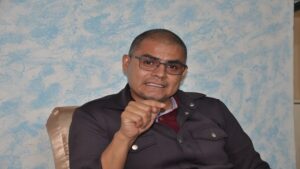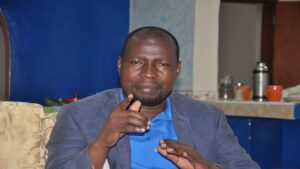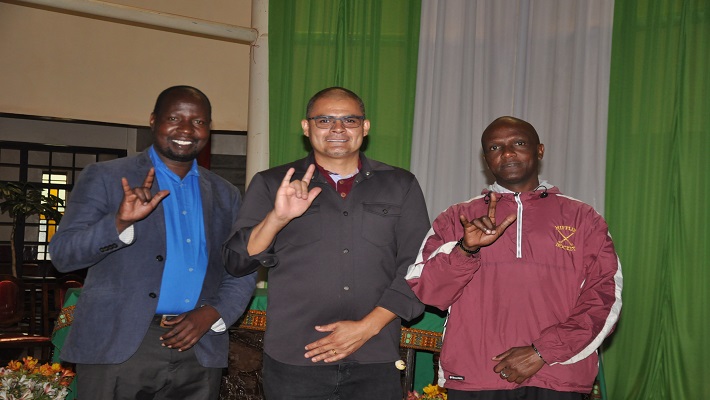By Paschal Norbert
NAIROBI, OCTOBER 3,2023 (CISA)– In September, the Kenya National Association of the Deaf (KNAD) in collaboration with the Catholic Archdiocese of Nairobi Chaplaincy to the Deaf organized a march in the capital to present a petition to the National Assembly as part of a two-day celebration marking the end of the International Deaf Awareness Month.
In the petition, received by Rarieda legislator, Otiende Amollo and presented to the clerk of the National Assembly on September 27, KNAD requested for the fast-tracking of the Kenyan Sign Language Bill 2023 and appealed to parliament to adopt a policy that would enable employment and a greater representation of its members “to the extent of at least 5% on employment opportunities and representation positions.”
They also emphasized the need for regulation of Sign language interpretations to only accredited interpreters and requested consideration of Media Houses to enlarge the size of images of persons interpreting on TV screens for greater visibility.

According to Fr Salvador Gomez Rubalcava MG, the chaplain of the Archdiocese of Nairobi Chaplaincy to the Deaf, “This awareness month for the deaf is for us as a hearing society to know what is happening, to know that the deaf need assistance and that we have to take care and love them because they are human beings.”
The member of the Guadalupe Fathers notes that September is particularly important not only to the deaf community but also to the public since many deaf people suffer rejection from the community and struggle to adopt.
“They are increasingly isolated. When in society, they develop what I sometimes call an inferiority complex. This is because the deaf community feel like they are oppressed. They feel like the society doesn’t like them, the society doesn’t want them,” he says in an interview with CISA on September 28, at Christ the King Parish-Kibera.
Fredrick Otieno, the only deaf catechist in the archdiocese expounds on the theme for this year “A Kenya where people can sign anywhere.” He notes that on several occasions society does not understand the needs of people with hearing impairments, hence the theme.
“It is not only in Kenya alone but throughout the world. It started so many years back so they fixed the month of September every year to make an awareness of the deaf people; how the deaf live and their struggles. For example, in a Church, the deaf can’t hear and converse and you cannot force a deaf person to talk. In such a situation, they are going to use their hands in communication. We also have our right of communication through our language so we try to express ourselves without hiding anything. This is the reason why every person needs to learn sign language even if they are not deaf,” he maintains.

According to Fredrick, the deaf in Kenya face many challenges right from the schools for the deaf to discrimination on employment opportunities, lack of representation and gender-based abuses.
“We have deaf schools, maybe the government is going to employ a person who doesn’t know sign language. In the workplace deaf people are struggling every day with their lives, I cannot say exactly what percentage of deaf people are employed. We have very few people,” he states.
Fredrick says that the reality of life is even tougher for deaf women. He notes that “deaf women or girls when they go to hospital they find people who don’t know how to communicate with them in the hospitals. This can affect their lives because they cannot access the proper services in the hospital due to the communication barrier.”
Both Fr Salvador and Fredrick advocate for teaching people the basics of sign language and even an introduction of the same into the curriculum in order to bridge the communication barrier between people with hearing impairment and others.
“In the family how will the deaf children communicate if maybe the family does not know sign language? It is good to know at least the basics so that you don’t have a society that is divided,” says Fredrick.
Fr Salavdor also appeals for pastoral accompaniment of the deaf after they finish school. He observes that many of the people with hearing impairment backslide on their faith immediately after they leave the institutions.
Fredrick, a former student at Nyang’oma Primary School for the Deaf, an institution started by the Franciscan Sisters of St. Anna (Lwak Sisters), explains “In Nyang’oma they are getting the sacraments in school but once they go out of the school, we have a lot of confusion whereby many who are Catholics end up joining the protestant churches because they have enough people to care for them. We have some who became pastors along the way but before they were Catholics.”
According to Fr Salvador, the Church needs to widen the tent to accommodate fully the deaf community. In the long run, as part of the pioneer chaplaincy to the deaf, he hopes that the Catholic bishops in Kenya adopt the practice and institute every chaplaincy in their respective dioceses.
He appeals “the message is to invite them to Sign language. It is a beautiful language and if you go to the constitution of Kenya 2010, you will find that Sign language is one of the three official languages in Kenya including, Kiswahili and English.”
